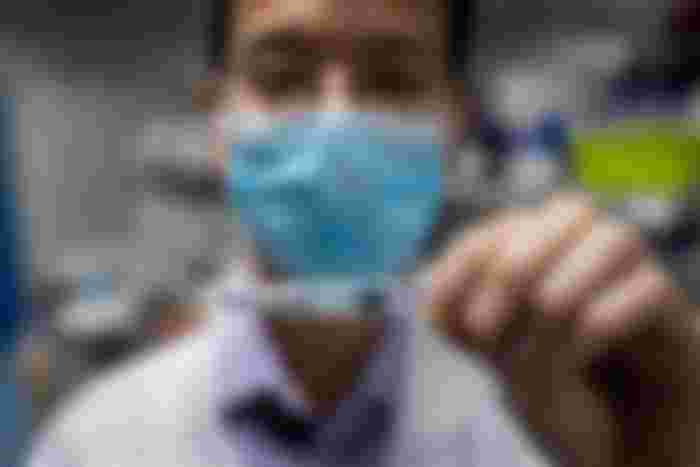
One way to quickly see if a coronavirus vaccine works would be to immunize healthy people and then deliberately expose them to the virus, some researchers are suggesting.
Proponents say this strategy, called a human challenge trial, could save time because rather than conducting tests the usual way — by waiting for vaccinated people to encounter the virus naturally — researchers could just infect them.
Challenge trials have been used to test vaccines for typhoid, cholera, malaria and other diseases. For malaria, volunteers have stuck their arms into chambers full of mosquitoes to be bitten and infected. But there were so-called rescue medicines to cure those who got sick. There is no cure for Covid-19.
For both ethical and practical reasons, the idea of challenge trials for a coronavirus vaccine has provoked fierce debate.
ADVERTISEMENT
Continue reading the main story
[bad iframe src]
In a draft report published last month, the World Health Organization said that challenge trials could yield important information, but that they would be daunting to run because of the potential of the coronavirus “to cause severe and fatal illness and its high transmissibility.”
The report, by a 19-member advisory panel, provided detailed guidelines about the safest way to conduct challenge trials, recommending that they be limited to healthy people ages 18 to 25 because they have the least risk of severe illness or death from the virus. The virus — in a dose carefully calculated to produce an infection but unlikely to cause severe illness — would be dripped into their noses.
Thanks for reading The Times.
But the panel also said its members split nearly in half over several major issues. They were divided over whether trials should be carried out if no highly effective therapy had been identified to treat participants who got sick; over whether studies in healthy young adults could predict the efficacy of a vaccine in older people or other high-risk adults; and over whether challenge trials could really speed vaccine development.
Coronavirus Vaccine Tracker
A look at all the vaccines that have reached trials in humans.
In the United States, government researchers say that although their primary focus is on traditional clinical trials, they have already begun preparing for human challenge trials, in case they are needed to test either vaccines or treatments. The National Institute for Allergy and Infectious Diseases is developing strains of the virus that could be used to infect participants.
ADVERTISEMENT
Continue reading the main story
Dr. Anthony Fauci, head of the institute, said in an interview on Wednesday that challenge trials might be needed if the pandemic waned and there were not enough natural infections to determine in a traditional study whether a vaccine worked. But given the rising case numbers now, he said he expected no shortage of infections by July and August, when several large trials are scheduled to begin.
Citing concerns about putting healthy people at risk, Dr. Fauci said that any challenge trial would have to be conducted “with absolute intense examination by a group of independent ethicists and independent people who have nothing to do with the trial.”
Latest Updates: Global Coronavirus Outbreak
Updated 3h ago
As infections in the U.S. are rising sharply, the death rate has dropped.
With U.S. infections surging, Trump visits Mt. Rushmore for fireworks.
For the U.S. capital, July 4 will mean protests as well as celebration.
More live coverage:
But the National Institutes of Health, the umbrella organization for the institute, offered a more cautious assessment, saying the government “is not planning to support human challenge studies for Covid-19,” in an email from a spokeswoman, Renate Myles. “There is an expectation of sufficient natural transmission for efficacy studies that will be launched as early as summer 2020. The development of a human challenge model would take longer than this timeline and human challenge studies have a number of serious ethical considerations.”
ADVERTISEMENT
Continue reading the main story
Among the staunchest advocates of challenge trials is Dr. Arthur L. Caplan, a bioethicist at NYU Langone Medical Center.
Image
Dr. Jeffrey Kahn, the director of the Johns Hopkins Berman Institute for Bioethics, opposes challenge trials. “There are too many uncertainties,” he said.Credit...Rosem Morton for The New York Times
“I haven’t really heard convincing ethical counter objections,” he said in an interview.
A challenge trial could take advantage of the lower death rate in people ages 18 to 29, Dr. Caplan and Dr. Stanley Plotkin, a vaccine expert and professor emeritus at the University of Pennsylvania, suggested in an article published in April in the journal Vaccine.
“Despite the danger, we believe it is ethical to ask now for volunteers who would be informed about the known and unknown risks,” they wrote.
ADVERTISEMENT
Continue reading the main story
Other researchers have made similar arguments.
“Such an approach is not without risks, but every week that vaccine rollout is delayed will be accompanied by many thousands of deaths globally,” a team led by Dr. Nir Eyal, a bioethicist at Rutgers, wrote in March, in an article in The Journal of Infectious Diseases.
Dr. Eyal’s group suggested choosing an age range of 20 to 45, and even proposed using a control group that would receive a placebo shot rather than the vaccine but would still be exposed to the virus, so at least some would almost certainly fall ill.
“I think that’s a little bit cuckoo,” Dr. Caplan said. “That’s too risky.”
There is no highly effective treatment for Covid, and no sure way to predict who will recover quickly and who will become severely ill.
“Multiple measures would be put in place to ensure that, prior to consenting, potential participants fully comprehend the unusual risks involved in the study,” Dr. Eyal’s group wrote.
ADVERTISEMENT
Continue reading the main story
Dr. Jeffrey Kahn, director of the Johns Hopkins Berman Institute of Bioethics, sharply questioned any form of a challenge trial for Covid, saying that participants cannot be fully informed about the risks, because too little is known about the virus.
“There are too many uncertainties,” he said.
Although it is not common, healthy young people have inexplicably become critically ill from the virus, and some have died.
“All we need is one of those cases in the course of a vaccine trial where we intentionally infected somebody with this coronavirus,” Dr. Kahn said. “What would we say then? Was it worth it?”
Image
A volunteer received thumbs up before drinking a solution containing typhoid for a challenge trial at Churchill Hospital in Oxford in 2017.Credit...Andrew Testa for The New York Times
ADVERTISEMENT
Continue reading the main story
Several vaccine makers had lukewarm reactions to the idea. Dr. Paul Stoffels, chief scientific officer at Johnson & Johnson, said the company would consider challenge trials only if a treatment became available. He also said larger, traditional Phase 3 trials would provide more safety information.
Dr. Tal Zaks, chief medical officer of Moderna, which expects to begin Phase 3 vaccine trials this month, said in an interview that the question of a challenge trial “will likely be moot as it relates to our development.”
“If such a model were available we would look at it, but I’d hate to put people in harm’s way,” Dr. Zaks said. “We are right now leading this race and it might be relevant for other vaccines behind us.”
Other vaccine makers are considering the idea. Dr. Adrian Hill, director of the Jenner Institute at the University of Oxford, which developed a coronavirus vaccine that is already in Phase 3 testing, said there was “potential utility” in challenge trials for vaccines and treatments. He said his institute, which has conducted such studies in the past for malaria, typhoid and other diseases, might perform one for Covid before the end of the year, to test vaccine efficacy. He said the studies were also a good way to compare vaccines.
ADVERTISEMENT
Continue reading the main story
The trials would be acceptable even without a treatment, he said, because the participants would be young and fit, and exposed to only a low dose of the virus, so any illness that occurred would most likely be “self-limiting.”
But Dr. Hill added: “Having a treatment would be helpful. By the time we get to doing this there may be one.”
Dr. Caplan argues that the first few vaccine candidates are likely to fail, and that it will be increasingly difficult to recruit the 20,000 or 30,000 people needed for each subsequent trial. Challenge trials in small numbers of participants could more quickly identify products that do not work, letting researchers scrap them and reserve larger studies for more promising candidates.
But small challenge studies may miss rare side effects that could become a serious problem once a vaccine is given to millions of people.
ADVERTISEMENT
Continue reading the main story
“The number of people who will have received the vaccine at the time of licensure will be very small in comparison to the usual Phase 3 efficacy trials,” said Dr. William Schaffner, an infectious disease expert at Vanderbilt University and a member of a group that will review vaccine data as advisers to the Centers for Disease Control and Prevention.
Because many vaccine candidates involve new technologies, “that’s all the more reason you need a large safety base,” Dr. Schaffner said.
Challenge trials might also be seen by the public as a means of cutting corners, and undermine confidence in coronavirus vaccines, he said, adding, “I think it’s not a great idea.”
Image
Josh Morrison runs an advocacy group for kidney donors and supports the idea of a coronavirus challenge trial.Credit...Jackie Molloy for The New York Times
ADVERTISEMENT
Continue reading the main story
Advocates say volunteers for a coronavirus challenge trial would be young and healthy, without chronic health problems. They would also have a “substantial” risk of catching the disease anyway — even without being deliberately exposed — because they live in hot spots with high transmission rates, or because of their jobs or living conditions, proponents say.
They would be quarantined and monitored closely, and if they became ill would receive the best known treatment — possibly the antiviral drug remdesivir, or convalescent plasma from people who had recovered from the illness. But so far, remdesivir’s benefits have been described as “modest,” and studies of convalescent plasma are still underway. The steroid dexamethasone lowered the death rate in one study, but is recommended only for those who become severely ill.
The article by Dr. Eyal’s group struck a chord with Josh Morrison, 34. Eight years ago, he donated a kidney to a stranger, and now runs an advocacy group for kidney donors. The opportunity to save someone else’s life meant a great deal to him, and he sees challenge trials as a chance to do it again.
“If it could lead to a speedier creation of a vaccine for the disease Covid-19, we are willing — without reservation — to have doctors infect us with the novel coronavirus,” he and Sophie Rose, 22, a graduate student in epidemiology, wrote in The Washington Post.
ADVERTISEMENT
Continue reading the main story
Mr. Morrison, who had a brief career as a corporate lawyer, has begun organizing others who are interested in volunteering into a group called 1DaySooner. So far, about 30,000 people from 140 countries have signed up online saying they might participate in a challenge trial. Donations of $700,000 have enabled him to hire three full-time staff members.
